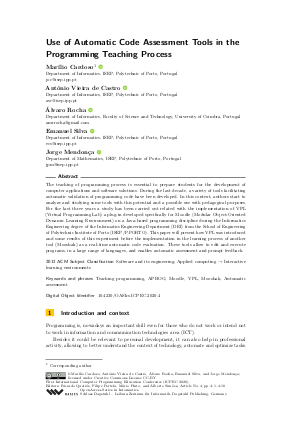Use of Automatic Code Assessment Tools in the Programming Teaching Process
Authors
Marílio Cardoso  ,
António Vieira de Castro
,
António Vieira de Castro  ,
Álvaro Rocha
,
Álvaro Rocha  ,
Emanuel Silva
,
Emanuel Silva  ,
Jorge Mendonça
,
Jorge Mendonça 
-
Part of:
Volume:
First International Computer Programming Education Conference (ICPEC 2020)
Part of: Series: Open Access Series in Informatics (OASIcs)
Part of: Conference: International Computer Programming Education Conference (ICPEC) - License:
 Creative Commons Attribution 3.0 Unported license
Creative Commons Attribution 3.0 Unported license
- Publication Date: 2020-06-15
File

PDF
OASIcs.ICPEC.2020.4.pdf
- Filesize: 2.55 MB
- 10 pages
Document Identifiers
Subject Classification
ACM Subject Classification
- Software and its engineering
- Applied computing → Interactive learning environments
Keywords
- Teaching programming
- APROG
- Moodle
- VPL
- Mooshak
- Automatic assessment
Metrics
- Access Statistics
-
Total Accesses (updated on a weekly basis)
0Document
0Metadata
Abstract
The teaching of programming process is essential to prepare students for the development of computer applications and software solutions. During the last decade, a variety of tools facilitating automatic validation of programming code have been developed. In this context, authors start to analyze and studying some tools with this potential and a possible use with pedagogical purposes. For the last three years a study has been carried out related with the implementation of VPL (Virtual Programming Lab) a plug-in developed specifically for Moodle (Modular Object-Oriented Dynamic Learning Environment) on a Java-based programming discipline during the Informatics Engineering degree of the Informatics Engineering Department (DEI) from the School of Engineering of Polytechnic Institute of Porto (ISEP/P.PORTO). This paper will present how VPL was introduced and some results of this experiment before the implementation in the learning process of another tool (Mooshak) as a real-time automatic code evaluation. These tools allow to edit and execute programs, in a large range of languages, and enables automatic assessment and prompt feedback.
Cite As Get BibTex
Marílio Cardoso, António Vieira de Castro, Álvaro Rocha, Emanuel Silva, and Jorge Mendonça. Use of Automatic Code Assessment Tools in the Programming Teaching Process. In First International Computer Programming Education Conference (ICPEC 2020). Open Access Series in Informatics (OASIcs), Volume 81, pp. 4:1-4:10, Schloss Dagstuhl – Leibniz-Zentrum für Informatik (2020)
https://doi.org/10.4230/OASIcs.ICPEC.2020.4
BibTex
@InProceedings{cardoso_et_al:OASIcs.ICPEC.2020.4,
author = {Cardoso, Mar{\'\i}lio and de Castro, Ant\'{o}nio Vieira and Rocha, \'{A}lvaro and Silva, Emanuel and Mendon\c{c}a, Jorge},
title = {{Use of Automatic Code Assessment Tools in the Programming Teaching Process}},
booktitle = {First International Computer Programming Education Conference (ICPEC 2020)},
pages = {4:1--4:10},
series = {Open Access Series in Informatics (OASIcs)},
ISBN = {978-3-95977-153-5},
ISSN = {2190-6807},
year = {2020},
volume = {81},
editor = {Queir\'{o}s, Ricardo and Portela, Filipe and Pinto, M\'{a}rio and Sim\~{o}es, Alberto},
publisher = {Schloss Dagstuhl -- Leibniz-Zentrum f{\"u}r Informatik},
address = {Dagstuhl, Germany},
URL = {https://drops.dagstuhl.de/entities/document/10.4230/OASIcs.ICPEC.2020.4},
URN = {urn:nbn:de:0030-drops-122913},
doi = {10.4230/OASIcs.ICPEC.2020.4},
annote = {Keywords: Teaching programming, APROG, Moodle, VPL, Mooshak, Automatic assessment}
}
Author Details
- Department of Informatics, Faculty of Science and Technology, University of Coimbra, Portugal
References
- Marina Umaschi Bers, Louise Flannery, Elizabeth R. Kazakoff, and Amanda Sullivan. Computational thinking and tinkering: Exploration of an early childhood robotics curriculum. Computers & Education, 72:145-157, 2014. URL: https://doi.org/10.1016/j.compedu.2013.10.020.
-
Julio C Caiza and Jose M Del Alamo. Programming assignments automatic grading: review of tools and implementations. In 7th International Technology, Education and Development Conference (INTED2013), page 5691, 2013.

- J.Marílio Cardoso, António Vieira de Castro, Rosa Barroso, Álvaro Rocha, and Rui Marques. Introducing vpl on a programming learning process. In EDULEARN18 Proceedings, 10th International Conference on Education and New Learning Technologies, pages 8499-8508. IATED, 2-4 july 2018. URL: https://doi.org/10.21125/edulearn.2018.1981.
-
Eduarda Pinto Ferreira and Ângelo Martins. Eduscrum - the empowerment of students in engineering education? In Proceedings of the The 12th International CDIO Conference, page 596, Turku University of Applied Sciences, Turku, Finland, 2016.

- ICPC. The icpc international collegiate programming contest. Accessed on 20.01.2020. URL: https://icpc.baylor.edu/.
-
Craig Larman. Agile and iterative development: a manager’s guide. Agile software development series. Addison-Wesley Professional, Boston, USA, 2004.

-
José Paulo Leal and Fernando Silva. Mooshak: A web-based multi-site programming contest system. Software: Practice and Experience, 33(6):567-581, 2003.

-
José Paulo Leal and Fernando Silva. Using mooshak as a competitive learning tool. In The 2008 Competitive Learning Symposium, 2008.

-
Xiangfeng Luo, Marc Spaniol, Lizhe Wang, Qing Li, Wolfgang Nejdl, and Wu Zhang. Advances in Web-Based Learning-ICWL 2010: 9th International Conference, Shanghai, China, December 8-10, 2010, Proceedings, volume 6483. Springer, 2010.

-
Jo~ao Maroco and Teresa Garcia-Marques. Qual a fiabilidade do alfa de cronbach? quest~oes antigas e soluç~oes modernas? Laboratório de psicologia, pages 65-90, 2006.

-
Juan Carlos Rodríguez-del Pino, Enrique Rubio Royo, and Zenón Hernández Figueroa. A virtual programming lab for moodle with automatic assessment and anti-plagiarism features. In Proceedings of the 2012 International Conference on e-Learning, e-Business, Enterprise In-formation System, 2012.

-
Jeff Sutherland. Scrum: The Art of Doing Twice the Work in Half the Time. Crown Business, 2014.

